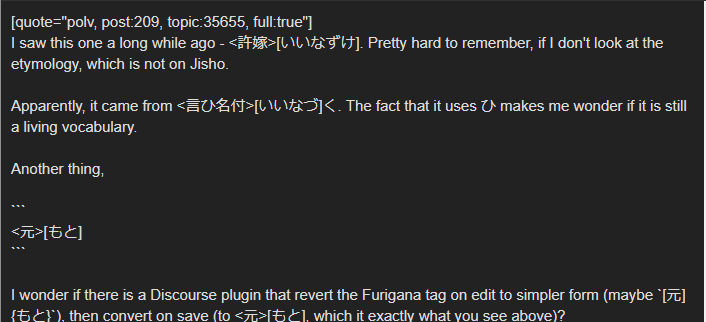
⠀
貫く = to pierce = 列抜く
I imagine 釁る comes from 血塗る
霖 from 長雨 as well
Anyone know what the origin is for 跪く (ひざまずく)? I always think of it like 膝 + 不味く as a sort of mnemonic, but I can’t find its actual origin.
Can’t find any authoritative source either.
But someone on twitter suggests it could be part of a 〜突く family, among「うなずく」、「ぬかずく」and 「かしずく」. At least うなずく and ぬかずく have clear origin from 項突く and 額突く according to gogen-yurai.jp.
Also there is the phrase 膝を突く - Jisho.org, so it seems to check out, but doesn’t explain where the ま come from ![]()
Jisho lists ひざまづく as an alternate spelling, which gives credence to the ひざま + つく. ひざ of course means knee but that still doesn’t explain what the ま is doing there.
Just ran into 娶る, which is read めとる and comes from 妻 (め) 取る. Interesting that Goo explains the origin as 妻 and not 女, but I guess at a certain point they are related given the reading め is possible for both. Maybe I’ll put both in the table as origin since Goo says 妻, but Wiktionary says 女.
刃’s やいば reading apparently comes from 焼き刃, so another one whose kun is made up of its other kun.
And 必ず from 仮成らず, hmm.
Aaaaand 裸’s はだか is from 肌 and 赤.
Looking up the etymology of kun’yomi really does help remember them.
I saw this one a long while ago - 許嫁. Pretty hard to remember, if I don’t look at the etymology, which is not on Jisho.
Apparently, it came from 言ひ名付く. The fact that it uses ひ makes me wonder if it is still a living vocabulary.
Another thing,
<ruby lang = 'ja-JP'>元<rp>(</rp><rt>もと</rt><rp>)</rp></ruby>
I wonder if there is a Discourse plugin that revert the Furigana tag on edit to simpler form (maybe [元]{もと}), then convert on save (to 元, which it exactly what you see above)?
I think having <rp> tags is a good practice, although a little clunky, and lang= attribute makes it even clunkier (and doesn’t <rt> tags need lang attribute as well?)
Something like this?
It’s a userscript called IME2Furigana that works pretty well. [Userscript] Forum: IME2Furigana
What do you mean by that?
I built a Discourse plugin (well, mostly reused someone else’s open source code) doing exactly that, which I sent to Viet, but he never actually enabled it. Not sure if he thought it was too risky or simply forgot. Unfortunately it’s not something users can use without it being added on the backend. I tried to also convert it into a userscript, but I wasn’t able to get it working in that form.
If you’re curious:
The fact that it uses ひ means that it’s using classical spelling. That’s just how the thing that sounds like い as okurigana used to be spelled in the past.
This topic was automatically closed 365 days after the last reply. New replies are no longer allowed.

